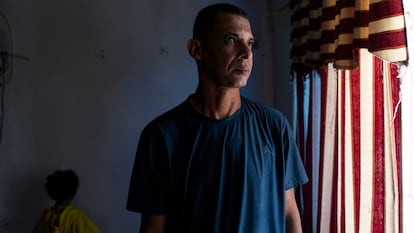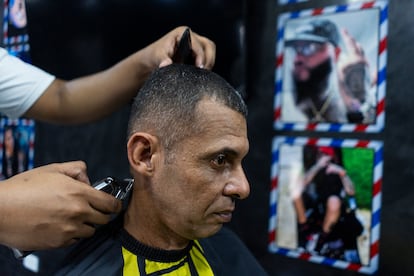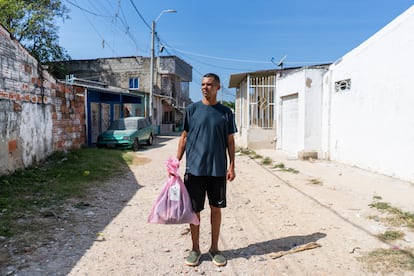Jaime Valdiris’ journey as a Trump deportee: ‘It’s a very cruel thing’
The Colombian tells of the mistreatment to which US authorities subject migrants expelled after the Republican assumed the presidency


Jaime Valdiris’ heart was about to jump out of his chest. He had just crossed from Tijuana to San Diego and was running terrified along a highway full of vehicles. A white Ford stopped a centimeter before turning him into a pulp. A Border Guard helicopter crossed the mauve sky, broken by the first light of dawn. He understood that it was time to surrender and knelt with his hands behind his head. The police officer who stopped him made a face when he found out where he came from: “Fucking Colombian thief. Don’t you know Donald Trump?”
He didn’t answer, but of course he knew who that was. When he appeared on television he laughed; he had never seen someone orange before. Trump was the president of the United States, there was no way he hadn’t heard about that. He thought he was a dangerous man, full of anger. He hated immigrants, that was clear. And Valdiris became one that day when he crossed into the United States, on January 15. Two weeks later he was sent back to his country. Those who have traveled like him wear shackles on their wrists, feet, and waist. That chain on their abdomen tightens like a vice. During the entire flight they forced him to put his head between his legs, which causes dizziness and a feeling of suffocation. They don’t let them go to the bathroom.
“It’s a very cruel thing. You don’t do that, you fag,” Valdiris says now at his home in Barranquilla. The degrading treatment suffered by deportees on the way back home has put Trump at odds with the main left-wing presidents of Latin America, Claudia Sheinbaum, Gustavo Petro, and Luiz Inácio Lula da Silva. Lula complained about the way in which 88 Brazilians had been returned, who staged a mutiny on board for fear of dying of suffocation. The president of Mexico has also expressed her displeasure, but in a more diplomatic way, at Trump’s threat to impose 25% tariffs on Mexican imports. The same intimidation was received by Petro, the only leader who dared to try to prevent two flights landing in these conditions. However, hours later the Colombian president had to agree to continue with the deportations. A trade war with Washington would ruin his country’s economy.
For Valdiris, there is no such condition. His finances are already destroyed. He lives in Las Malvinas, a neighborhood where the police do not patrol at night for fear of what might happen. He has five children from two marriages. He rents a small house with three rooms, one bathroom, and a narrow backyard where clothes are hung. On one wall of the living room hangs a calendar from a Chinese restaurant and a picture of the Virgin of Guadalupe. Valdiris, tall and thin, has the ungainly air of many Caribbean people. He recounts even the most horrendous things with grace. At 51, he was a motorcycle taxi driver. Saving was impossible for him; all the money that came in went out the door after a while. At the end of 2024, a cousin who lives in Pennsylvania, a place he had never heard of, suggested he go there. She would get him a job at the factory where she works, no problem.

To organize the trip, they sent him the phone number of a coyote, a human trafficker. The coyote asked him for $6,000, half in advance. Valdiris sold his motorcycle and asked for the rest from some lenders who charge leonine interest rates — “laugh at Trump.” He sent the first $3,000 and they sent him back two plane tickets with his name on them for December 13. The first, from Barranquilla to Bogotá, and the second, from Bogotá to Mexico City. He only told his family and a few friends. He didn’t want it to be known in Las Malvinas, where gossip abounds.
He left early one morning with a suitcase and a cap. He was leaving his children and wife in a house where he owed two months’ rent and three months’ electricity bills. At the Bogotá airport he met three other Colombians who had hired the same coyote. They were from Medellín, Cartagena, and Pereira. All four were given instructions on how to behave when they were interviewed by immigration agents in Mexico.
— I had to say that I was a tourist. That I was going to stay at Hotel X and that I wanted to see the Monument to the Revolution and the pyramids. I had to wear white or black, not bright colors. All of that had to be memorized, you receive it on your cell phone and then you delete it.
Valdiris says that he was already sweating thinking about the “lot of money” he would lose if they sent him back. The immigration officer, “the guy,” asked him a few standard questions and must not have suspected anything. He let him through. Neither he nor the other three Colombians had any desire to visit Mexico City. The stress had left them exhausted. They headed straight to the address of a motel that their contact had sent them. There, a bed with clean sheets and a hot shower awaited them.
Valdiris pauses his story for a moment to go to the corner store to buy a Coca Cola for his little son.

The barber, Andrés Amariz, blue cap backwards, tattooed arms, flip-flops, sees him cross in front of his shop and shouts:
— I told you not to go! It wasn’t good!
— No way, bro.
The barber was one of the few in Las Malvinas who knew Jaime’s secret. Now, he is worried about the debt he has no way to pay.
— They took you for 25 million [pesos, around $6,000]?
Valdiris takes it with humor.
— For much less!
After spending the night at the motel, he returned to the airport and took a flight to Tijuana. That’s when the hard part began. He repeated the story that he was a tourist. “Tourist, ummm,” the officer replied. They locked him in a room with four Chinese and two Indians. The one who seemed to be “the boss” came in later with his passport in his hand and Valdiris remembers him saying: “Damn Colombians, what are you doing here? Go to Barranquilla to see the ocean!” They took his phone away. After a while, another immigration officer arrived.
— He said to me: “I’m going to be clear with you. My boss doesn’t accept $100 or $200. How much do you have there?” I told him $200. He said no, that he wouldn’t let me go even for $500. I said: I swear by my son and God that I don’t have any more money. The guy got upset with that. He told me that I didn’t have to call anyone, that it was just him and me there. He explained to me that he was going to leave my passport with me and that when he came back for it, I should put the money in it. I put in $300 dollars and 200 Mexican pesos that I had in my pocket. He took it and when the guy came back, he said to me: “Jaime Valdiris, welcome to Tijuana.” I think he was acting smart.

When he left, it was already midnight. He was scared to death. Tijuana, the land of cartels, is a danger to anyone with the word Colombian written on their forehead. They are warned not to take a taxi, not to walk down the street, to pretend they don’t speak Spanish... The coyote sheltered him in a place for two days. He killed his boredom by watching television. Then events unfolded in dizzying fashion. They took him to the border and he crossed at a point where two trucks were entering. He remembers that they told them to run as fast as they could and to turn themselves in when they got to the other side.
He had been told that when he encountered the U.S. Border Patrol he should say that he had come in search of a better future for his children. “I didn’t even have time to say that. They stopped us. There was the patrolman who asked me if I knew Trump. ‘Don’t you watch the news? Don’t you see that Trump doesn’t want Colombians?’ They took our belts, laces, cell phones. From there the torment begins.” For the next two weeks, the agents constantly told him “go, go, go.” And it has stuck in his head. Stunned as he is by everything that has happened, he is first to get up at home, when it is still early in the morning, and he walks through the rooms saying the same thing, clapping his hands. Valdiris has become his children’s immigration agent.
He was locked up in an immigration facility in San Diego, California. He slept in cell 8a. He was given a pink bag to store his belongings, which bore the seal of the United States Department of Homeland Security. He says he was given a shirt and pants, and some shoes without laces. On Monday, January 27, he was taken by bus to a military airport, where he was joined by the other immigrants who were traveling on the flight that Petro had sent back. When he got off the bus, his shackles were removed and he climbed the stairs as a free man, for the first time in 12 days.
When he entered the plane, the Colombian Air Force greeted him and the rest of the Colombians with applause. Then he understood the dimension that the confrontation between Petro and Trump had taken. He saw the Colombian Foreign Minister Luis Gilberto Murillo, who seemed to him to be a “handsome man.” He grabbed two slices of pizza from the boxes at the entrance, a Coca Cola, and settled into one of the seats. He slept for a good part of the seven-hour flight. When he landed, he saw through the window that there were press waiting on the runway. And Valdiris, who has a great sense of stagecraft, got off the plane with his arms raised and shouting “thank you, Father,” referring to God, not Petro or Trump. Another deportee who was next to him asked him, confused, what he was celebrating. “And I told him: Look, daddy, I’m in my country. Long live Colombia!”

Sign up for our weekly newsletter to get more English-language news coverage from EL PAÍS USA Edition
Tu suscripción se está usando en otro dispositivo
¿Quieres añadir otro usuario a tu suscripción?
Si continúas leyendo en este dispositivo, no se podrá leer en el otro.
FlechaTu suscripción se está usando en otro dispositivo y solo puedes acceder a EL PAÍS desde un dispositivo a la vez.
Si quieres compartir tu cuenta, cambia tu suscripción a la modalidad Premium, así podrás añadir otro usuario. Cada uno accederá con su propia cuenta de email, lo que os permitirá personalizar vuestra experiencia en EL PAÍS.
¿Tienes una suscripción de empresa? Accede aquí para contratar más cuentas.
En el caso de no saber quién está usando tu cuenta, te recomendamos cambiar tu contraseña aquí.
Si decides continuar compartiendo tu cuenta, este mensaje se mostrará en tu dispositivo y en el de la otra persona que está usando tu cuenta de forma indefinida, afectando a tu experiencia de lectura. Puedes consultar aquí los términos y condiciones de la suscripción digital.








































